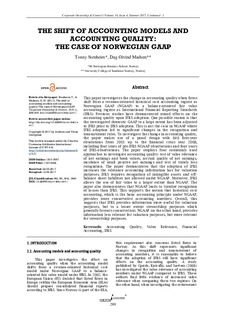The shift of Accounting Models and Accounting Quality: The case of Norwegian GAAP
Journal article, Peer reviewed
Published version

View/
Date
2017Metadata
Show full item recordCollections
- Publikasjoner fra CRIStin - BI [1015]
- Scientific articles [2181]
Original version
Corporate ownership & control. 2017, 14 (4-1), 289-300. http://dx.doi.org/10.22495/cocv14i4c1art11Abstract
This paper investigates the change in accounting quality w hen firms shift from a revenue - oriented historical cost accounting regime as Norwegian GAAP (NGAAP) to a balance - oriented fair value accounting regime as International Financial Reporting Standards (IFRS). Previous studies have demonstrated mixed effects o n the accounting quality upon IFRS adoption. One possible reason is that the investigated domestic GAAP to a large extent has been adjusted to IFRS prior to IFRS adoption. This is not the case in NGAAP where IFRS adoption led to significant changes in the recognition and measurement rules. To investigate the change in accounting quality, the paper makes use of a panel design with 640 firm - year obserations from 2001 up to the financial crisis year 2008, including four years of pre - IFRS NGAAP observations and four years of IFRS - observations. The paper employs four commonly used approaches to investigate accounting quality: test of value relevance of net earnings and book values, accrual quality of net earnings, incidence of small positive net earnings and test of timely loss recognition. The paper demonstrates that the adoption of IFRS increases the relevance accounting information has for valuation purposes. IFRS requires recognition of intangible assets and off - balance sheet liabilities not allowed under NGAA P. Moreover, IFRS allows the use of fair value to a larger extent than NGAAP. The paper also demonstrates that NGAAP leads to timelier recognition of losses than IFRS. This supports the notion that historical cost accounting, which is the basic accounting principle under NGAAP, provides more conservative accounting numbers. Overall, this suggests that IFRS provides information more useful for valuation purposes, but to a lesser extent stewardship purposes which generally favours conservatism. NGAAP on the o ther hand, provides information less relevant for valuation purposes, but more relevant for stewardship purposes.
Description
This is an Open Access journal available from http://www.virtusinterpress.org